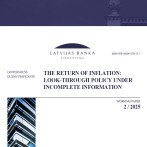Annual inflation in March increased under the influence of both global and, slightly, also domestic factors
In March 2015, the annual inflation continued to increase, reaching 0.4%. Even though the global oil prices (in euro) dropped once again after having risen slightly at the end of February and beginning of March, fuel businesses retained the raised fuel prices. Core inflation increased slightly, possibly as a result of the redistribution of consumption from one set of goods to other goods and services, increasing their demand.
The rise in oil prices in the second half of February and beginning of March was rather short-lived: even though the prices did not return to this year's lowest level reached at the beginning of February, in March they dropped slightly. This drop was not reflected in the retail prices of fuel, but no further substantial rise in fuel prices was observed and their level remained 4.3% higher than the February average. The heat energy prices dropped according to the AS "Latvijas Gāze" tariff projections. Meanwhile, the stabilizing oil prices in the global market allow AS "Latvijas Gāze" to include in its April projections a further drop in tariffs: currently it has been predicted that it may be possible in June for industrial consumers. So the heat energy prices could drop another notch in those areas where heat supply enterprises use natural gas in production.
Global food prices continued to drop in March, and the only group of goods where, as a result of the unfavourable weather conditions in the largest exporter countries, rising prices were observed for a second consecutive month was dairy products. The lifting of European Union (EU) quotas creates an opposite supply effect on the price level. The EU is one of the largest dairy exporters in the world, thus the common global and, to some extent, also Latvian dairy price trends will depend on whether, as a result of rising supply in Europe, the increase in global prices will be reduced. In Latvia, in the food products group in March, it was primarily (characteristically for the season) vegetable and potato prices that increased and the annual price changes for food remained negative.
Along with the supply of the new season wearing apparel and footwear, their price level increased, yet parallel to it, there were places where sales were still observed. The seasonal rise in prices in these groups of goods slightly exceeded the one characteristic of the previous years but did not have a substantial impact on the annual inflation, for the March rise was from a slightly lower level than, for instance, a year ago.
Demand and the related annual rise in non regulated service prices in Latvia is still one of the inflation maintaining factors, yet in part such an impression of demand could be created by consumption expenses being channelled from the goods to the service sector. In view of the annual drop in food and energy prices as well as the drop in actual heat energy bills as a result of the warmer winter and smaller consumption of the physical amount of energy, the saved finances can be diverted to service consumption. Thus the expenses redistribution effect may create an impression of a supply side maintained core inflation, for it includes industrial goods and non regulated services whose prices are more indirectly related to the global food and energy prices. In March, the prices of tourism services underwent an atypical rise (after dropping atypically in February) and prices of financial and catering services continued to rise gradually.
Even though "KVV Liepājas metalurgs" has resumed operations and is employing several hundreds of people, thus having a positive effect on the average income of society, currently the enterprise is still operating with a much lower level of capacity utilization than it could and, even taking into account the impact of institutional factors on the rising wages in the economy, overall, the rise in real income this year could slow down this year because of the slower economic growth.
Other inflation raising factors will have a very insignificant effect on this year's inflation: for instance, the previously adopted changes in the excise tax for tobacco and the possible changes of this same tax for alcoholic beverages can outweigh each other in part, because the amount of excise on some beverages is expected to be reduced. The change in zoning of car parks and the rise in tariffs in Riga accounts for such a small part of total consumption expenses that it is not expected to substantially cause a rise in inflation.
Textual error
«… …»






